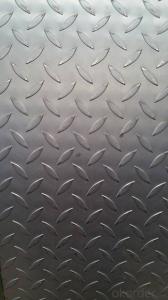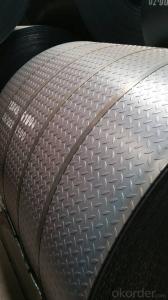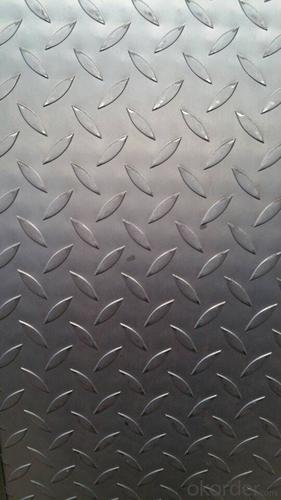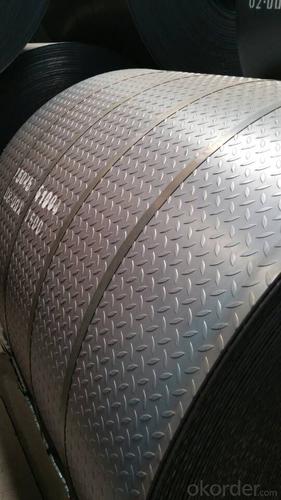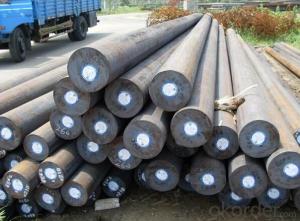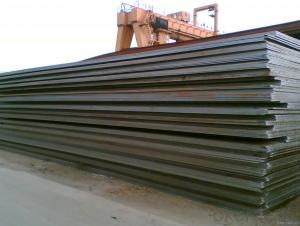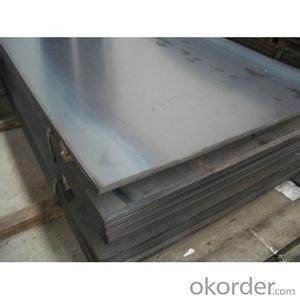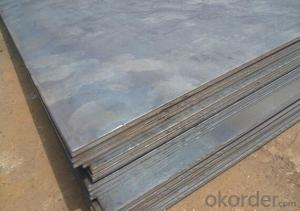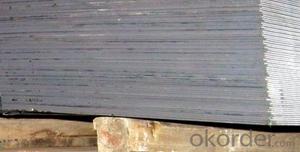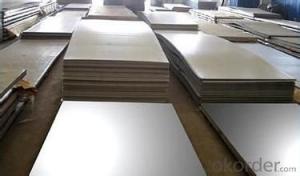HR Q235 Hot Rolled Steel Plates Alloy Steel Sheets
- Loading Port:
- Tianjin
- Payment Terms:
- TT OR LC
- Min Order Qty:
- 25 m.t.
- Supply Capability:
- 50000 m.t./month
OKorder Service Pledge
OKorder Financial Service
You Might Also Like
Specification
HR Q235 Hot Rolled Steel Plate High Alloy Steel Sheet
Product Description:
1.Q235 hot rolled steel plate and sheet with high strength
2. Thickness:8mm-250mm, width:1500mm-2250mm
3.ISO and BV certificate
4.Standard:GB/T 3274-2007,JIS G3106,DIN17100, ASTM, BS4360
5.Delivery condition: According to the requirements of customers, the carbon steel mild steel plate and sheet could be hot rolled, cold rolled, normalized, annealed, tempered, normalized+ tempered and tempering.
6.Application:The low alloy steel plate and sheet with high strength is mainly used in making Plants, general constructions, different kinds of engineering machines such as electric wheels skip, mine car, excavator, loaders, bulldozers, industrial blower, various cranes used in mines and other structures.
Specification:
Material | Q235 | Round bar | Dia(mm) | 16-600 |
Process | EAF + LF + VD + Forged + Heat Treatment (optional) | Length (mm) | Max 12000 | |
Heat treatment | Normalized / Annealed / Quenched / tempered | Flat bar | Thickness(mm) | 8-500 |
Delivery condition | Hot forged +Rough machined (black surface after Q/T)+ Turned (optional) | Width(mm) | 70-200 | |
Test | Ultrasonic test according to SEP 1921-84 D/d | Length (mm) | Max 12000 |
Chemical Composition:
C | Si | Mn | Cr | Ni | Cu |
0.5~0.8 | 0.17~0.37 | 0.25~1.2 | ≤0.25 | ≤0.30 | ≤0.25 |
Packing and Delivery:
Packing in bundle with steel strips and shipped by break bulk vessel or container (depend on target market and different ports)
Delivery Detail: Approx.45 days
Usage and Applications:
1.Q235 Hot Rolled Steel Plate High Alloy Steel Sheet is used in a large number of architectural and engineering structures. Or it can be used in construction of plants for the production of steel house frames, high-voltage transmission towers, bridges, vehicles, boilers, containers, ships, etc.
2. And we can use this kind of product on the performance of the mechanical parts if the demand is not very high.
3. Some especial material steel round bar can be used for main shaft of steamer, hummer shank, with big section and supper force.
Product Show:
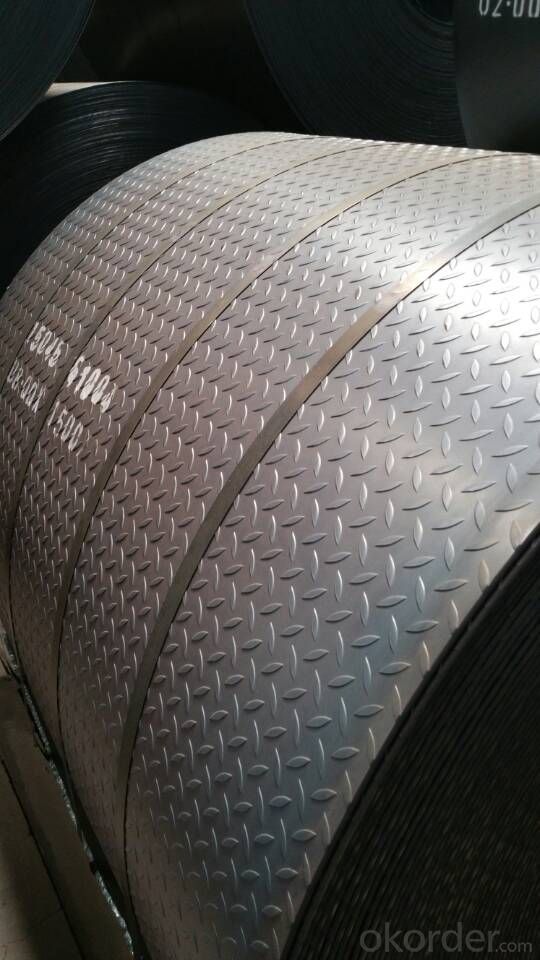
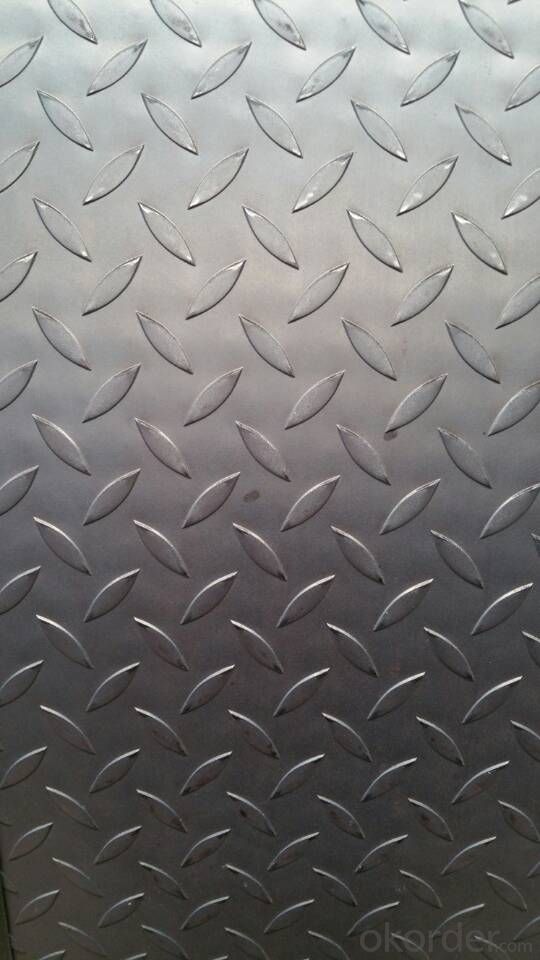
- Q: How does special steel contribute to reducing product costs while maintaining quality?
- Special steel contributes to reducing product costs while maintaining quality through several ways. Firstly, special steel possesses enhanced strength and durability, allowing manufacturers to produce products with thinner gauges or smaller dimensions, reducing material usage and overall costs. Additionally, its superior corrosion resistance and longevity ensure that the products have a longer lifespan, reducing the need for frequent replacements. Moreover, special steel's exceptional machinability enables efficient production processes, reducing labor costs and increasing productivity. Lastly, its high precision and consistency in manufacturing contribute to minimizing defects and waste, resulting in cost savings and improved product quality. Overall, special steel's unique properties and characteristics enable manufacturers to optimize production, thereby reducing costs without compromising on product quality.
- Q: What are the applications of special steel in the oil and gas industry?
- Special steel is widely used in the oil and gas industry for various applications. It is commonly utilized in the construction of pipelines, as it possesses high strength and corrosion resistance, which ensures the safe and efficient transportation of oil and gas. Special steel is also employed in the manufacturing of drilling equipment, such as drill bits, casing, and tubing, as it can withstand extreme conditions, including high pressure and temperature. Furthermore, special steel is utilized in the fabrication of storage tanks and offshore platforms, providing durability and resistance to harsh environmental factors. Overall, the applications of special steel in the oil and gas industry contribute to the reliability and longevity of the infrastructure and equipment involved in the extraction, processing, and transportation of oil and gas.
- Q: What are the corrosion resistance properties of special steel?
- Special steel, also known as stainless steel, exhibits excellent corrosion resistance properties. This is primarily due to the presence of chromium, which forms a protective layer on the surface of the steel, preventing oxidation and corrosion. Additionally, special steel alloys may contain other elements such as nickel, molybdenum, and titanium, further enhancing their corrosion resistance. These properties make special steel highly suitable for various applications in industries such as construction, automotive, and aerospace, where resistance to corrosion is essential for long-term durability and performance.
- Q: What are the different cryogenic grades of special steel?
- Specifically designed for use in extremely low temperature environments, there are several cryogenic grades of special steel available. These grades have been developed to retain their mechanical properties and prevent brittleness at cryogenic temperatures, making them ideal for applications such as LNG storage tanks, aerospace equipment, and low-temperature chemical processes. Among the commonly used cryogenic grades is the 300 series stainless steel, particularly types 304 and 316. These stainless steels contain nickel, which enhances their cryogenic toughness and ability to withstand thermal stress. Consequently, they are frequently employed in the construction of cryogenic storage vessels and piping systems. Another popular cryogenic grade is the 9% nickel steel, which is alloyed with approximately 9% nickel. This alloy provides excellent low-temperature toughness and ductility. As a result, it is often chosen for constructing LNG storage tanks, capable of withstanding the extremely cold temperatures required for the storage and transportation of liquefied natural gas. In addition, there are special low-temperature carbon steels, such as ASTM A350 LF2 and ASTM A333 Grade 6, which are engineered to maintain their toughness and impact resistance at cryogenic temperatures. These steels find extensive use in low-temperature applications, including cryogenic piping systems and equipment for the oil and gas industry. In conclusion, the various cryogenic grades of special steel encompass stainless steels (such as the 300 series stainless steel), 9% nickel steel, and low-temperature carbon steels (like ASTM A350 LF2 and ASTM A333 Grade 6). Each grade has been specifically designed to endure the challenges presented by extremely low temperatures while retaining their mechanical properties and resistance to brittleness.
- Q: What are the different methods of coating special steel?
- There are several different methods of coating special steel, including galvanizing, electroplating, powder coating, and thermal spraying. Galvanizing involves dipping the steel in a bath of molten zinc to create a protective layer. Electroplating uses an electric current to deposit a thin layer of metal onto the steel surface. Powder coating involves applying a dry powder to the steel and then curing it with heat to form a durable coating. Thermal spraying uses a high-velocity stream of molten or semi-molten material to create a protective layer on the steel.
- Q: What is the maximum temperature that special steel can withstand?
- The maximum temperature that special steel can withstand depends on the specific type of steel being used. Special steels are designed to have enhanced properties, such as high heat resistance, which allows them to withstand higher temperatures than standard steels. For example, some special steels, such as heat-resistant stainless steels, can withstand temperatures up to around 1200 degrees Celsius (2200 degrees Fahrenheit). These steels are often used in applications where high temperatures are encountered, such as in furnaces, boilers, and exhaust systems. Other types of special steels, such as tool steels or high-speed steels, may have different maximum temperature limits. These steels are commonly used in cutting tools, molds, and machining applications, where they need to maintain their hardness and strength at elevated temperatures. It is important to note that the maximum temperature that special steel can withstand also depends on factors such as the duration of exposure to the high temperature, the specific alloy composition, and any additional heat treatment processes that have been applied. Therefore, it is crucial to consult the manufacturer's specifications or seek professional advice for accurate information on the maximum temperature limit for a particular type of special steel.
- Q: What are the different food processing grades of special steel?
- In the food industry, there are numerous special steel grades used for food processing. These grades are tailor-made to meet the stringent requirements of food processing, guaranteeing product safety and quality. One widely employed grade of special steel for food processing is AISI 304 stainless steel. This grade is renowned for its exceptional resistance to corrosion, making it suitable for environments where food is processed. Additionally, it exhibits high resistance to chemicals and acids, enhancing its suitability for food processing applications. Another frequently utilized grade in the food industry is AISI 316 stainless steel. This grade offers superior corrosion resistance compared to AISI 304 and is commonly employed in applications involving direct contact between equipment and food or food-related substances. Furthermore, AISI 316 stainless steel withstands high temperatures, making it suitable for use in food processing operations that involve intense heat. Moreover, specific food processing grades of special steel have been developed for environments with stringent hygiene requirements. These grades, such as AISI 316L and 1.4404, possess a smoother surface finish, preventing bacterial buildup and facilitating easier cleaning. Overall, the various grades of special steel used in food processing offer different levels of resistance to corrosion, temperature, and hygiene. These characteristics ensure that the steel utilized in food processing equipment is durable, safe, and compliant with industry standards.
- Q: What are the advancements and trends in the field of special steel?
- Recent years have seen remarkable progress and emerging patterns in the field of special steel, which have brought about revolutionary changes in various industries. The primary driving force behind these advancements is the increasing demand for high-performance materials in critical applications such as aerospace, automotive, energy, and construction. One of the major breakthroughs in the field of special steel is the development of advanced manufacturing techniques. Conventional steel production methods have been replaced by more efficient processes, such as electric arc furnaces and vacuum induction melting, resulting in improved steel quality and enhanced mechanical properties. These advancements have made it possible to produce special steels with exceptional strength, corrosion resistance, and heat resistance. Another significant trend in the field of special steel is the emergence of new alloy compositions. Researchers and manufacturers are continuously exploring and developing innovative alloying elements to enhance the properties of special steels. For example, the addition of elements like chromium, molybdenum, and vanadium has led to the creation of stainless steels with outstanding resistance to corrosion and oxidation. Furthermore, advancements in heat treatment processes have also been witnessed in the field of special steel. By utilizing advanced heat treatment techniques such as quenching and tempering, austempering, and martempering, special steels can achieve the desired hardness, toughness, and dimensional stability. These advancements have significantly broadened the range of applications for special steels, allowing them to be used in critical components that operate under extreme conditions. In addition to the progress in manufacturing and alloy compositions, there is a growing inclination towards the development of environmentally friendly special steels. With increasing concerns about sustainability and carbon footprint, researchers and manufacturers are focusing on reducing the environmental impact of steel production. This has resulted in the creation of special steels with lower carbon content, as well as the implementation of energy-efficient manufacturing processes. Moreover, the field of special steel is witnessing the integration of digital technologies and automation. The utilization of artificial intelligence, machine learning, and data analytics enables manufacturers to optimize production processes, improve quality control, and reduce costs. This shift towards Industry 4.0 is transforming the production and utilization of special steel, ensuring greater efficiency and precision in the manufacturing process. In conclusion, the field of special steel is experiencing significant advancements and trends that are fostering innovation in various industries. The development of advanced manufacturing techniques, new alloy compositions, improved heat treatment processes, environmentally friendly production methods, and the integration of digital technologies are revolutionizing the properties and applications of special steel. These advancements have not only enhanced the performance and durability of special steel but have also opened up new possibilities for its utilization in critical applications.
- Q: How does special steel contribute to the agriculture aftermarket industry?
- The agriculture aftermarket industry relies heavily on special steel, which plays a vital role in enhancing productivity and efficiency in farming operations through the provision of high-performance components and equipment. Special steel, also known as alloy steel, is specifically engineered to possess properties such as strength, durability, corrosion resistance, and heat resistance, making it well-suited for various agricultural applications. One of the major contributions of special steel to the agriculture aftermarket industry is the manufacturing of machinery parts that are durable and reliable. These parts, including plowshares, blades, and tines, face harsh conditions such as intense wear, impact, and exposure to corrosive substances. However, special steel components can endure these challenges and offer a longer service life, resulting in reduced downtime and maintenance costs for farmers. Moreover, special steel is utilized in the production of agricultural equipment such as tractors, harvesters, and sprayers. These machines require materials that are both strong and lightweight to ensure optimal performance and fuel efficiency. The use of special steel grades provides the necessary strength while keeping the equipment's weight low, enabling farmers to cover larger areas and increase their productivity. Additionally, special steel alloys are employed in the manufacturing of precision tools used in precise farming techniques, such as cutting blades and drill bits. These tools allow farmers to carry out tasks with high accuracy, such as soil sampling, seeding, and crop monitoring. The durability and sharpness of special steel tools enhance the precision and effectiveness of these operations, leading to improved crop yields and efficient use of resources. Furthermore, special steel is also utilized in the construction of infrastructure related to the agriculture aftermarket industry. Steel beams and columns, for example, are used in the fabrication of storage facilities, barns, and grain silos, providing structural strength and stability. This infrastructure enables efficient storage, handling, and transportation of agricultural products, contributing to the overall efficiency of the industry. In conclusion, special steel is an indispensable component of the agriculture aftermarket industry as it contributes to the production of durable machinery parts, lightweight equipment, precision tools, and robust infrastructure. By offering enhanced strength, durability, and corrosion resistance, special steel helps farmers improve productivity, reduce downtime and maintenance costs, and achieve better crop yields.
- Q: What are the different surface hardening methods used for special steel?
- There are several surface hardening methods used for special steel, including carburizing, nitriding, induction hardening, flame hardening, and laser hardening.
Send your message to us
HR Q235 Hot Rolled Steel Plates Alloy Steel Sheets
- Loading Port:
- Tianjin
- Payment Terms:
- TT OR LC
- Min Order Qty:
- 25 m.t.
- Supply Capability:
- 50000 m.t./month
OKorder Service Pledge
OKorder Financial Service
Similar products
Hot products
Hot Searches
Related keywords
